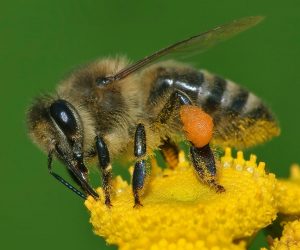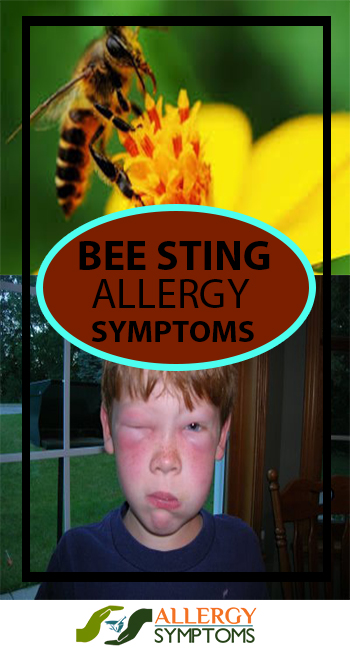A bee sting is tender and infuriating for several hours for some people, but not too serious for most of the people. Bee stings can produce dissimilar reactions that are vacillating from temporary pain and discomfort to a severe allergic reaction.
Apart from being painful, bee stings can cause you even red lumps as well as itching and swelling. Bee sting venom is having some quality of proteins, which will be affecting your skin as well as immune system and even you may also experience swelling around the area of sting site.

If any of you is suffering from the bee sting allergy, then the bee venom can cause a more serious immune system reaction to you that can also have the consequences of death. According to Healthline, a prominent benefactor of the health information and medical resources states that, there are about 3% of the people those who are allergic to bee stings.
For dictating that whether you are allergic to bee sting or not is most important, because after knowing you can acquire rapid emergency medical care if it is compulsory. Pay attention to your reactions for determining whether you have a life-threating allergy or just you are suffering from usual bee sting swelling and other symptoms.
When bee leaves its sting on your skin then immediately it needs to be removed straight away from your skin to help and preclude the infections. The sting should be scraped using something like thin plastic card. For taking out the sting one should not use fingers or tweezers for strainedit to avoid spreading the venom.
Symptoms of Bee Sting Allergy
Minor Symptoms of Bee Sting include:
- Itching or burning at areas affected by bee sting.
- Swelling
- Pain
- Redness
Severe Symptoms of Bee Sting Allergy include:
- Headache
- Diarrhea and abdominal cramping
- Dizziness
- Swelling of the face, lips and throat.
- Vomiting and nausea
- Hives
- Swallowing or difficulty in breathing
- Pale skin
- Week and swift heart rate
- Decrease in blood pressure
- Loss of sensitivity
- Stomach cramps
Look for urgent medical advice about a sting allergy, if any one of you is stung and develop any of the symptoms of anaphylactic shock,One should immediately go for medical help, if suffering from bee sting.
When to Pursue Medical Attention

Most of the people those who have been stung by a bee do not require medical attention. You should observer any minor symptoms, such as mild swelling and itching. If these symptoms don’t go away in few days or if you initiate to experience more severe symptoms then immediately meet your doctor.
If any one of you is experiencing symptoms of anaphylaxis, such as trouble and difficulty in breathing or swallowing in breath then immediately call the doctor for the emergency and go through the treatment. You have a duty to seek medical help if you have recognized allergy to bee stings or if you make sure that you ought to multiple bee stings.
When you meet the doctor he will examine you carefully and ask you about your age, weight and symptoms. It is also helpful to know which type of the bee stung you are suffering from and when the sting occurred.
How Bee Sting Allergy is diagnosed?
There are many of dissimilar tests that an allergy specialist may influence and make recommendations to a patient those who have allergy in order to determine the scale and type of an insect sting allergy.
Though, wherever possible a detailed history of the patient’s symptoms is undoubtedly more important due to rather imprecise results of some tests and a way that the body can change its allergic state quite unexpectedly.
For bee sting allergy diagnosis two tests are necessary for allergic people which are Skin prick test and allergy blood test.
Skin Prick Test
In this test the patient’s skin is pricked and a low dose of different venoms are acquaint with keen on the skin. The level of the reaction is observed, this can be an exceptional way of determining the scales of allergy and the exact inset to which the patient is allergic.
This test is cheap and simple any individual can go through this test but the most important possibility is anaphylaxis.
Blood Test
Your blood sample is taken for measuring the levels of venom specific IgE antibodies which are present in the blood. It also measures your immune system response to bee venom.
If any one of you is allergic to venom then your body may produce an antibody because you are hypersensitive to it. In this way the allergy professional can know the level of allergy that the patient is suffering from.
Treatment for Bee Sting Allergy
If any one of you has been stung by a bee then you should immediately remove the stinger from your body part where bee left sting. Because the venom will be released into your body for a few seconds after the bee left sting on your skin.
If you experience any sort of reaction, then you can put an ice pack on the area to reduce swelling. If you are experiencing any pain, then you can take an aspirin or acetaminophen. Make sure to keep in mind that aspirin should not be given to the children those who have been stung by a bee.
In case you need to go to the hospital for bee poisoning, then you must immediately see the doctor. Where, you will get good treatment by a healthcare professional who will display your vigorous signs that includes:
- Breathing rate
- Body temperature
- Your pulse
- Blood pressure.
Generally the patients who are suffering from bee sting allergy will be given medication called adrenaline or epinephrine to treat the allergic reaction.
Other Emergency treatment for Bee Poisoning includes
- Antihistamines and cortisone to improve breathing
- Oxygen to help you breathe
- CPR is given to patients whose heart stop beating or stop breathing.
- Beta antagonists to easiness breathing problems.
If you have known about the allergy to bee sting then you must carry a bee sting kit with you, whenever you are spending your time outside of your house. This kit contains a medication called epinephrine which is good for treating a severe allergic reaction that might create difficulties in breathing.

